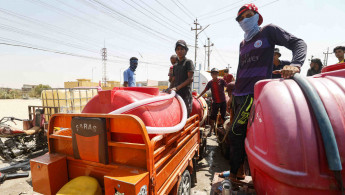Cholera outbreak feared in Basra as water crisis affects 100,000
Cases of water-borne illnesses have been mounting continuously, said local head of the Iraq High Commission for Human Rights (IHCHR) Mahdi al-Tamimi, prompting an ever-worsening crisis due to a lack of appropriate responses.
An official source from the Basra Health Department confirmed to The New Arab’s Arabic language service that there had been a rise in water-borne diseases, and an absence of support from the federal health ministry in Baghdad.
He explained that large numbers of people were coming to the hospital for treatment only to find out the necessary medication was not available. He added that the governor of Basra Asad al-Eidani and the provincial council had “abandoned” finding a solution to the crisis.
The source added that the problem was skyrocketing, which he said will “adversely affect the health and environmental situation in Basra,” adding that the government’s talk of aid and implementing a response to the crisis is a farce and merely a show for the media.
Earlier this month, the EU's envoy to Iraq was struck down by water poisoning, along with a top football club from Baghdad.
The damning remarks come as local officials in Basra are raising alarm over a possible cholera outbreak due to the unsanitary conditions in Iraq’s second city.
Twitter Post
|
The director of Basra’s Health Division Tahsin Sadiq said that the health facilities in the governorate are expecting an uptick in cholera in the coming months, telling local media that risk of an outbreak increases as the temperature drops. The salinity of the water in Basra is also risk factor for potentially lethal waterborne bacteria, officials added.
“In recent years, we have witnessed emergence of cholera in Basra and in other southern provinces,” Sadiq added, referring to the outbreak in Basra in 2007, where 7000 people were infected and 10 people died.
Kuwait has reportedly halted all food imports from Iraq due to the cholera risk in Basra.
Protests over the contaminated drinking water and general government neglect have gripped Basra over recent months, and a resurgence is likely if the current situation continues.
The leader of one of the city’s protests movements, Ali Mansouri, told The New Arab’s Arabic language service he deplores the dire humanitarian and environment situation in the region, stressing that the increase in water contamination cases in the past few days has been “frightening”.
He warned that the government’s broken promises over improving conditions in Basra may result in the masses returning to the streets in fresh show of rage.





 Follow the Middle East's top stories in English at The New Arab on Google News
Follow the Middle East's top stories in English at The New Arab on Google News


